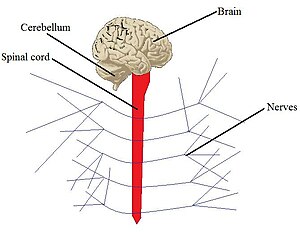Biological system
Appearance

In biology, a system is a group of organs that together perform a certain task. Common systems, such as those present in mammals and other animals, seen in human anatomy, are those such as the circulatory system, the respiratory system, the nervous system, etc.
A group of systems composes an organism, e.g. the human body.
Human systems
Humans have a a variety of systems due to the complexity of the species' organism. These specific systems are widely studied in Human anatomy. "Human" systems are also present in many animals.
- Circulatory system: pumping and channeling blood to and from the body and lungs with heart, blood, and blood vessels.
- Digestive system: digestion and processing food with salivary glands, esophagus, stomach, liver, gallbladder, pancreas, intestines, rectum, and anus.
- Endocrine system: communication within the body using hormones made by endocrine glands such as the hypothalamus, pituitary or pituitary gland, pineal body or pineal gland, thyroid, parathyroids, and adrenals or adrenal glands
- Integumentary system: skin, hair and nails
- Lymphatic system: structures involved in the transfer of lymph between tissues and the blood stream, the lymph and the nodes and vessels that transport it including the Immune system: defending against disease-causing agents with leukocytes, tonsils, adenoids, thymus, and spleen
- Muscular system: movement with muscles.
- Nervous system: collecting, transferring and processing information with brain, spinal cord, peripheral nerves, and nerves
- Reproductive system: the sex organs, such as ovaries, fallopian tubes, uterus, vagina, mammary glands, testes, vas deferens, seminal vesicles, prostate, and penis.
- Respiratory system: the organs used for breathing, the pharynx, larynx, trachea, bronchi, lungs, and diaphragm.
- Skeletal system: structural support and protection with bones, cartilage, ligaments, and tendons.
- Urinary system: kidneys, ureters, bladder and urethra involved in fluid balance, electrolyte balance and excretion of urine.
See also
External links
- Systems Biology: An Overview by Mario Jardon: A review from the Science Creative Quarterly, 2005.
- Synthesis and Analysis of a Biological System, by Hiroyuki Kurata, 1999.
